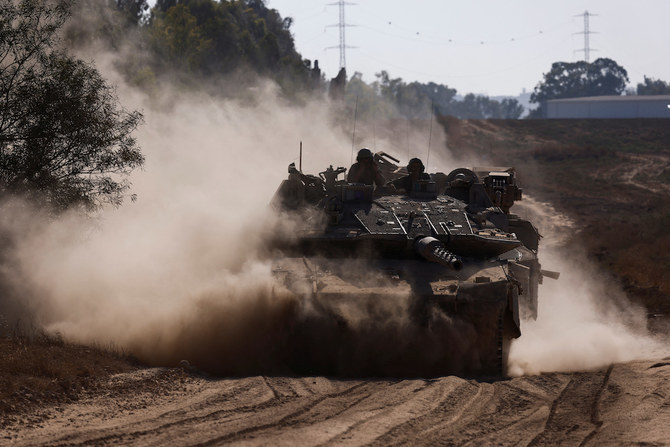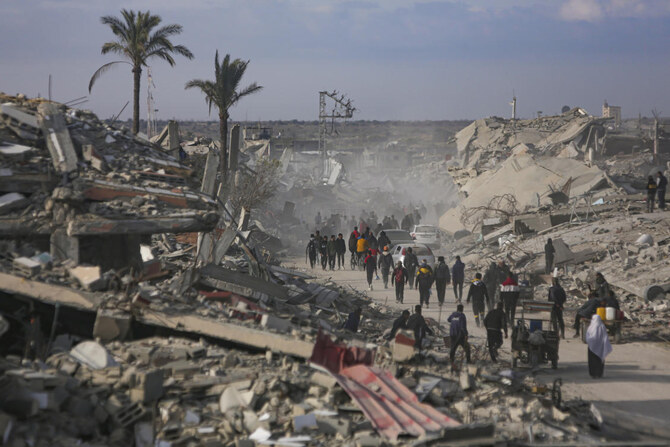GAZA: The Israeli army ordered a mass evacuation of Palestinians from much of Khan Younis on Monday, a sign that troops are likely to launch a new ground assault in the Gaza Strip’s second largest city.
The order suggested Khan Younis will be the latest of Israel’s repeated raids into parts of Gaza it has already invaded over the past eight months, pursuing Hamas militants as they regroup.
Much of Khan Younis was already destroyed in a long assault earlier this year, but large numbers of Palestinians have since moved back in to escape another Israeli offensive in Gaza’s southern-most city, Rafah.
The evacuation call covered the entire eastern half of Khan Younis and surrounding areas. Last week, the military ordered a similar evacuation from the north Gaza district of Shujaiya, where there has been intensive fighting since.
The order came as Israel released the director of Gaza’s main hospital after holding him for seven months without charge or trial over allegations the facility had been used as a Hamas command center. He said he and other detainees were held under harsh conditions and tortured.
The decision to release Mohammed Abu Selmia raised questions over Israel’s claims surrounding Shifa Hospital, which Israeli forces have raided twice since the start of the nearly nine-month war with Hamas. Abu Selmia and other Palestinian health officials have denied the accusations.
His release triggered an uproar across Israel’s political spectrum. Government ministers and opposition leaders expressed outrage and insisted Abu Salmia played a role in Hamas’ alleged use of the hospital — though Israeli security services rarely unilaterally free prisoners if they have a suspicion of militant links.
The decision appeared to have been taken to free up space in overcrowded detention centers. Prime Minister Benjamin Netanyahu ordered an inquiry, his office said, though it added that security officials independently determine whom to release “based on their professional considerations.”
Abu Selmia was released back into Gaza along with 54 other Palestinian detainees, many of whom also alleged abuse. The allegations could not be independently confirmed but matched other accounts of Palestinians who have been held in Israeli custody.
“Our detainees have been subjected to all kinds of torture behind bars,” Abu Selmia said at a news conference after his release. “There was almost daily torture.” He said guards broke his finger and caused his head to bleed during beatings, in which they used batons and dogs.
He said the medical staff at different facilities where he was held had also taken part in the abuse “in violation of all laws.” He said some detainees had limbs amputated because of poor medical care.
There was no immediate response from the prison service, which has previously denied similar accusations.
Israeli forces raided Shifa Hospital in November, alleging that Hamas had created an elaborate command and control center inside the facility. Abu Selmia and other staff denied the allegations and accused Israel of recklessly endangering thousands of patients and displaced people who were sheltering there.
The military uncovered a tunnel beneath Shifa Hospital leading to a few rooms, as well as other evidence that militants had been present inside the medical center, but the evidence fell short of what it had claimed before the raid.
Abu Selmia was detained on Nov. 22 while escorting a UN-led evacuation of patients from the hospital. He said his detention was “politically motivated,” adding that he had been brought to court at least three times but was never charged or allowed to meet with lawyers.
Israel has since raided other Gaza hospitals on similar allegations, forcing them to shut down or dramatically reduce services even as tens of thousands have been wounded in Israeli strikes or sickened in the harsh conditions of the war. The army raided Shifa a second time earlier this year, causing heavy destruction after saying that militants had regrouped there.
Hospitals can lose their protection under international law if combatants use them for military purposes, but any assaults on them must still be proportional to any military threat.
Amid the uproar over Abu Selmia’s release, the various Israeli state organs responsible for detentions scrambled to shift blame.
Itamar Ben Gvir, Israel’s far-right national security minister who controls the country’s police and prison service, said the releases constituted “security negligence” and blamed the Defense Ministry. Opposition leader Yair Lapid said Abu Selmia’s release was another sign of the government’s “lawlessness and dysfunction.”
Defense Minister Yoav Gallant’s office said the incarceration and release of prisoners is the responsibility of the prison service and the Shin Bet internal security agency. The prison service said the decision was made by the Shin Bet and the army, and released a document ordering his release that was signed by an army reserve general.
The Shin Bet said Abu Selmia had passed a risk assessment, “compared to other detainees.” It said the government had decided against its advice to release detainees determined to be less of a threat in order to free up space.
Since the start of the war, Israeli forces have detained thousands of Palestinians from Gaza and the occupied West Bank, crowding military detention facilities and prisons. Many are being held without charge or trial in what is known as administrative detention.
Israel launched its offensive after Hamas’ Oct. 7 attack, in which Palestinian militants killed some 1,200 civilians and took another 250 hostage. In its campaign, Israel has killed at least 37,900 Palestinians, according to Gaza’s Health Ministry, which does not say how many were civilians or fighters.
Most of Gaza’s population of 2.3 million have fled their homes, with many displaced multiple times. Israeli restrictions, ongoing fighting and the breakdown of public order have hindered the delivery of humanitarian aid, fueling widespread hunger and sparking fears of famine.
























